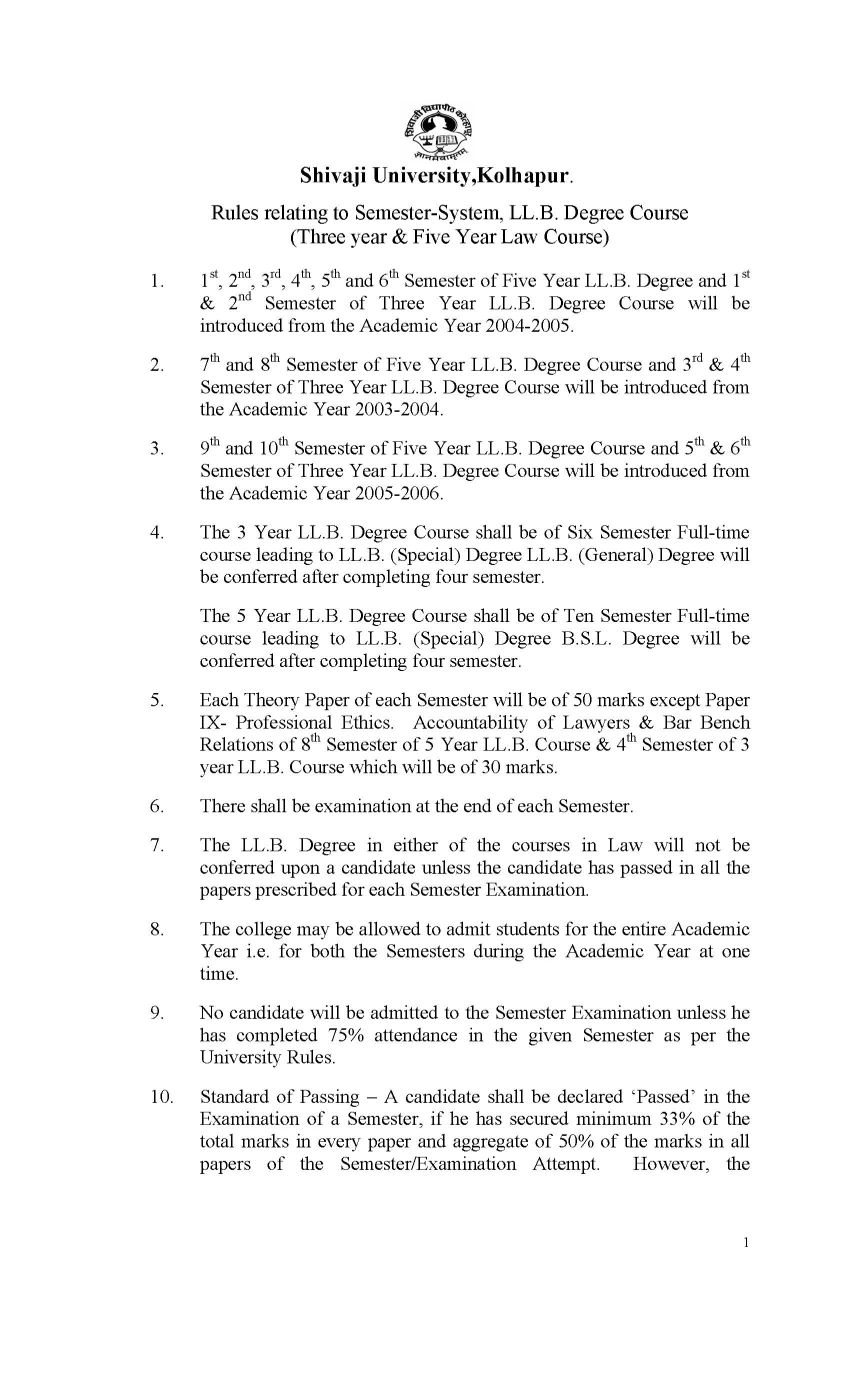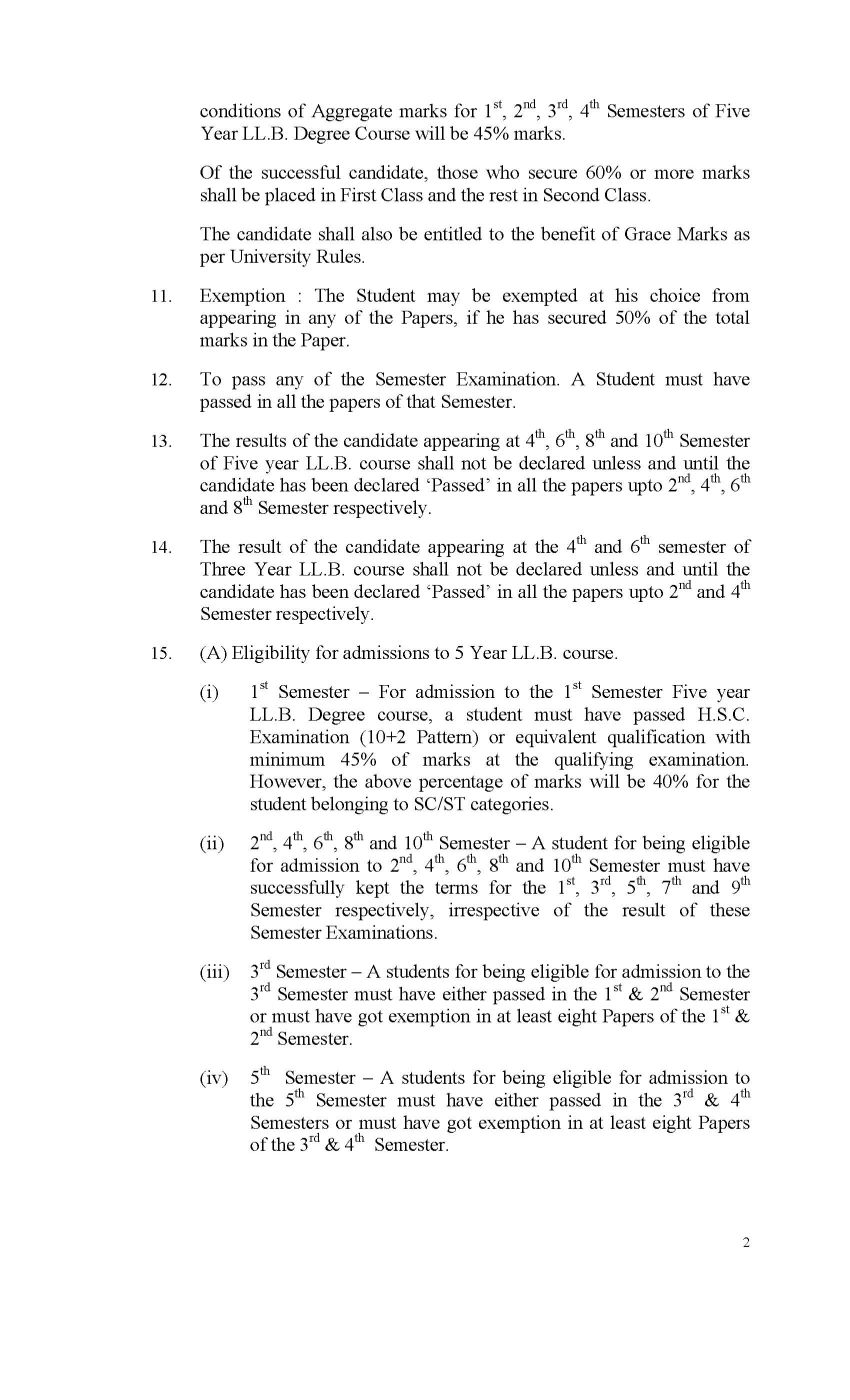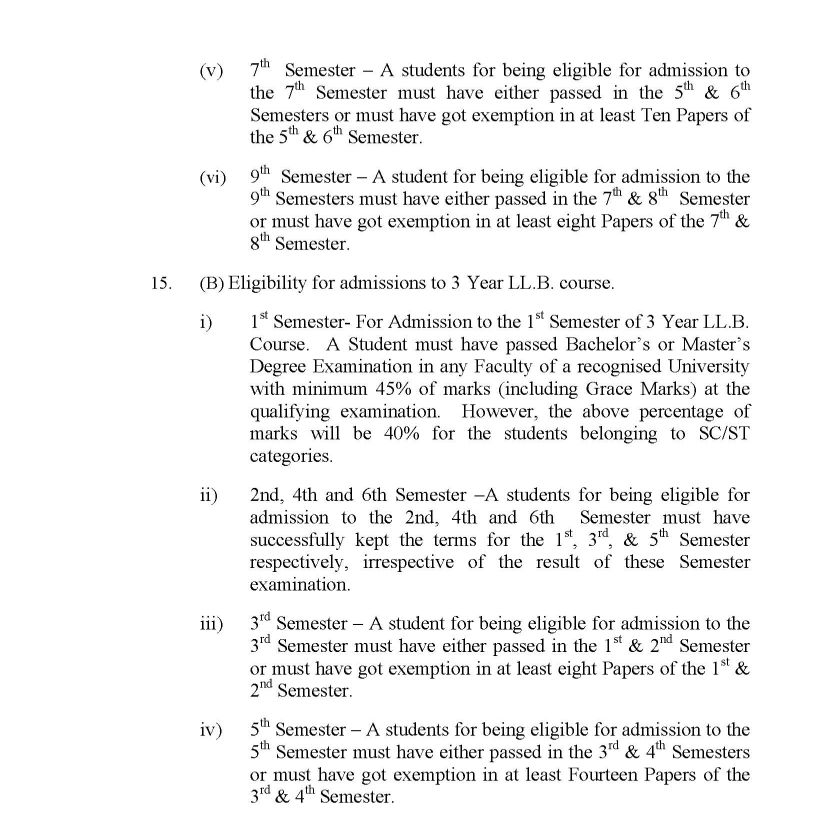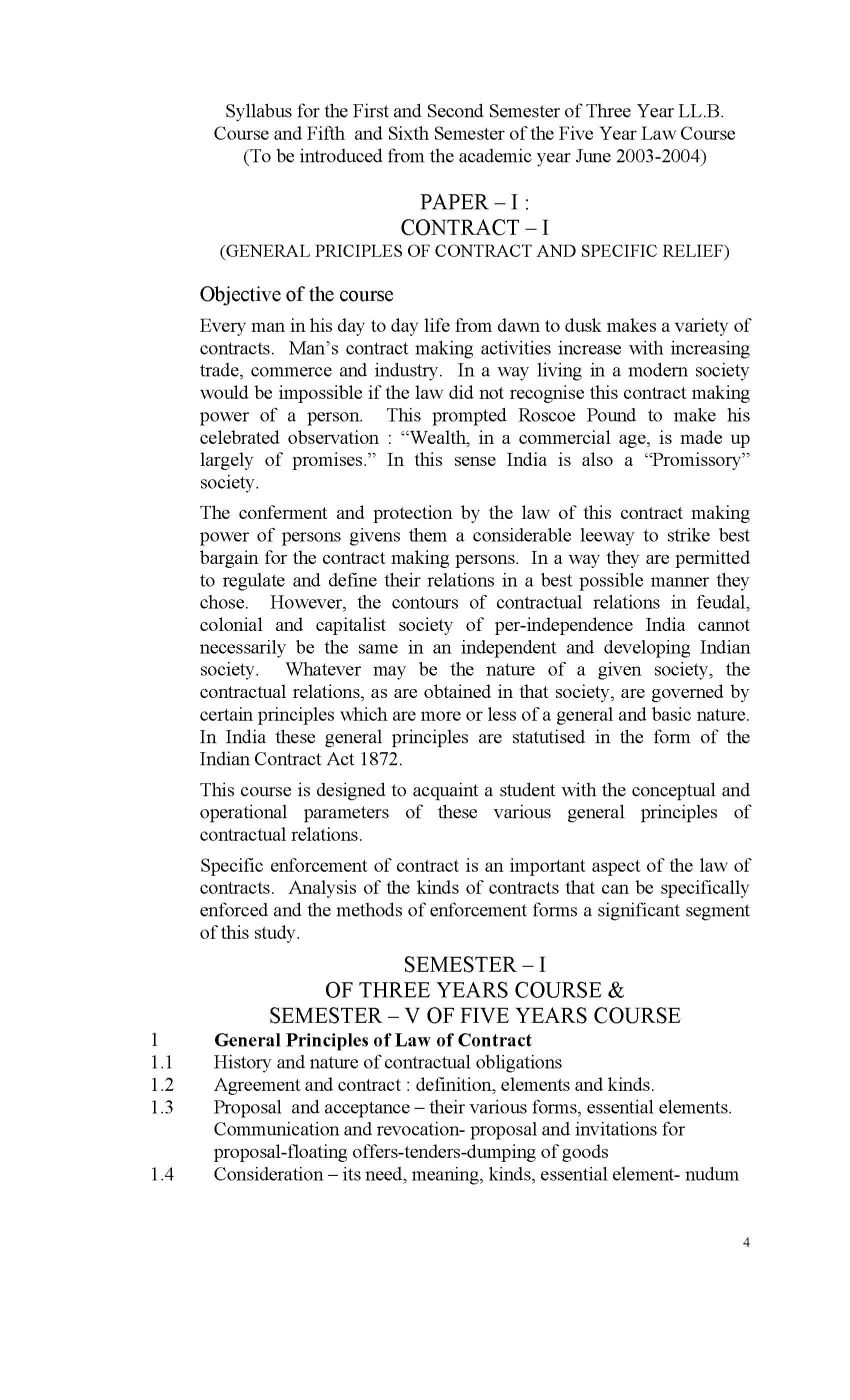| Re: Shivaji University LLB Syllabus
As you are looking for syllabus of 3rd Semester of LLB 3 Year Course offering by Shivaji University, so here I am providing syllabus:
Shivaji University 3 Year LLB 3rd Semester Syllabus:
PAPER I: CRIMINAL PROCEDURE CODE, JUVENILE JUSTICE ACT AND PROBATION OF OFFENDERS ACT
1. Introductory
1.1 The rationale of criminal procedure: the importance of fair trial.
1.2 Constitutional perspectives: Articles 14, 20 & 21.
1.3 The variety of criminal procedures (the class should examine, in particular the procedure for trial of special offences, especially, offences under the Prevention of Corruption Act and Narcotic Drugs and Psychotropic Substance Act)
1.4 The organisation of police, prosecutor, defence counsel and prison authorities and their duties, functions and powers.
2. Pre-trial process: arrest
2.1 The distinction between cognisable and non-cognisable offences: relevance and adequacy problems.
2.2 Steps to ensure accuseds presence at trial: warrant and summons.
2.3 Arrest with and without warrant (Section 70-73 and 41)
2.4 The absconder status (Section 82,83,84 and 85)
2.5 Right of the arrested person
2.6 Right to know grounds of arrest (Section 50(1), 55,75)
2.7 Right to be taken to magistrate without delay (Section 56,57)
2.8 Right of non being detained for more than twenty-four hours (section 57): 2.9 Article 22(2) of the Constitution of India.
2.9 Right to consult legal practitioner, legal aid and the right to be told of rights to bail.
2.10 Right to be examined by a medical practitioner (Section 54).
3. Pre-trial Process: Search and Seizure
3.1 Search warrant (Section 83,94,97, 98) and searches without warrant (Section 103)
3.2 Police search during investigation (Section 165,166,153)
3.3 General principles of search (section 100)
3.4 Seizure (Section 102)
3.5 Constitutional aspects of validity of search and seizure proceedings.
4. Pre-trial Process: FIR
4.1 F.I.R. (Section 154)
4.2 Evidentiary value of F.I.R. (See Sections 145 and 157 of Evidence Act)
5. Pre-trial Process: Magisterial Powers to Take Cognizance
6. Trial Process
1.1 Commencement of proceedings: (Section 200, 201, 202)
1.2 Dismissal of complaints (Section 203, 204)
1.3 Bail: concept, purpose: constitutional overtones
1.3.1 Bailable and Non- Bailable offences (Section 436, 437, 439)
1.3.2 Cancellation of bail (Section 437(5))
1.3.3 Anticipatory bail (Section 438)
1.3.4 Appellate bail powers (Section 389(1), 395(1), 437(5) )
1.3.5 General principles concerning bond (Sections 441-450)
7. Fair Trial
7.1 Conception of fair trial
7.2 Presumption of innocence.
7.3 Venue of trial.
7.4 Right of the accused to know the accusation (Section 221-224)
7.5 The right must generally be held in the accuseds presence (Section 221-224)
7.6 Right of cross-examination and offering evidence in defence: the accuseds statement.
7.7 Right to speedy trial.
8. Charge
8.1 Farming of charge
8.2 Form and content of charge (Section 211, 212, 216)
8.3 Separate charges for distinct offence (Section 218, 219, 220, 221, 223)
8.4 Discharge-pre-charge evidence.
9. Preliminary pleas to bar the trial
9.1 Jurisdiction (Section 26, 177-188, 461, 462, 479)
9.2 Time limitations: rationale and scope (Section 468-473)
9.3 Pleas of autrefois acquit and autrefois convict (Section 300, 22D)
9.4 Issue-Estoppel
9.5 Compounding of offences
10. Trial Before a court of Sessions: Procedural Steps and Substantive Rights
11. Judgement
11.1 Form and content (Section 354)
11.2 Summary trial
11.3 Post-conviction order in lieu of punishment: emerging penal policy (Section 360, 361, 31)
11.4 Compensation and cost (Section 357,358)
11.5 Modes of providing judgement (Section 353, 362, 363)
12. Appeal, Review, Revision
12.1 No appeal in certain cases (Section 372, 375, 376)
12.2 The rationale of appeals, review revision.
12.3 The multiple range of appellate remedies:
12.3.1Supreme Court of India (Section 374, 379, Articles 31, 132, 134, 136)
12.3.2 High Court ( Section 374)
12.3.3 Sessions Court (Section 374)
12.3.4 Special right to appeal (Section 380)
12.3.5 Governmental appeal against sentencing (Section 377, 378)
12.3.6 Judicial power in disposal of appeals (Section 368)
12.3.7 Legal aid in appeals.
12.4 Revisional jurisdiction (Sections 397-405)
12.5 Transfer of cases(Section 406-407)
13. Juvenile delinquency
13.1 Nature and magnitude of the problem
13.2 Causes
13.3 Juvenile court system
13.4 Treatment and rehabilitation of juveniles
13.5 Juveniles and adult crime
13.6 Legislative and judicial protection of juvenile offender
13.7 Juvenile Justice Act 2000
14. Probation
14.1 Probation of offenders law
14.2 The judicial attitude
14.3 Mechanism of probation: standards of probation services.
14.4 Problems and prospects of probation
14.5 The suspended sentence
15. Reform of criminal procedure.
PAPER II: LAW OF EVIDENCE
1. Introductory
1.1 The main features of the Indian Evidence Act 1861.
1.2 Other acts which deal with evidence (special reference to CPC, CrPC).
2. Central Conceptions in Law of Evidence
2.1 Facts: section 3 definition: distinction-relevant facts/facts in issue.
2.2 Evidence: oral and documentary.
2.3 Circumstantial evidence and direct evidence
2.4 Presumption (Section 4)
2.5 Proving, Not providing and disproving
2.6 Witness
2.7 Appreciation of evidence
3. Facts: relevancy
3.1 The doctrine of res gestae (Section 6,7,8,10)
3.2 Evidence of common intention (Section 10)
3.3 The problems of relevancy of Otherwise irrelevant facts(Section 11)
3.4 Relevant facts for proof of custom (Section 13)
3.5 Facts concerning bodies & mental state (Section 14, 15)
4. Admissions and confessions
4.1 General principles concerning admission (Section 17,23)
4.2 Differences between admission and confession
4.3 The problems of non-admissibility of confessions caused by any inducement, threat or promise(Section 24)
4.4 Inadmissibility of confession made before a police officer
(Section 25)
4.5 Admissibility of custodial confessions (Section 26)
4.6 Admissibility of information received from accused person in custody; with special reference to the problem of discovery based on joint statement(Section 27)
4.7 Confession by co-accused ( Section 30)
4.8 The Problems with the judicial action based on a retracted confession
5. Dying Declarations
5.1 The justification for relevance on dying declarations (Section 32)
5.2 The judicial standards for appreciation of evidentiary value of dying declarations.
6. Other Statements by Persons who cannot be called as Witnesses
6.1 General Principles.
6.2 Special problems concerning violation of womens rights in marriage in the law of evidence.
7. Relevance of Judgments
7.1 General Principles
7.2 Admissibility of judgments in civil and criminal matters (Section 43)
7.3 Fraud and Collusion (Section 44)
8. Expert Testimony
8.1 General Principles
8.2 Who is an expert? : types of expert evidence
8.3 Opinion on relationship especially proof of marriage (Section 50)
8.4 The problems of judicial defense to expert testimony.
9. Oral and Documentary Evidence
9.1 General principles concerning oral evidence ( Sections 59-60)
9.2 General principles concerning Documentary Evidence (Section 67-90)
9.3 General principles Regarding Exclusion of Oral by Documentary Evidence
9.4 Special problems: re-hearing evidence.
9.5 Issue estoppel
9.6 Tenancy estoppel (Section 116)
10. Witnesses, Examination and Cross Examination
10.1 Competency to testify (Section 118)
10.2 State privilege (Section 123)
10.3 Professional privilege (Section 126, 127, 128)
10.4 Approval testimony (Section 133)
10.5 General principles of examination and cross examination (Section 135-166)
10.6 Leading questions (Section 141-143)
10.7 Lawful questions in cross-examination (Section 146)
10.8 Compulsion to answer questions put to witness
10.9 Hostile witness (Section 154)
10.10 Impeaching of the standing or credit of witness (Section 155)
11. Burden of Proof
11.1 The general conception of onus probandi (Section 101)
11.2 General and special exceptions to onus probandi
11.3 The justification of presumption and of the doctrine of judicial notice.
11.4 Justification as to presumptions as to certain offences (Section
111A)
11.5 Presumption as to dowry death (Section 113B)
11.6 The scope of the doctrine of judicial notice (Section 114)
12. Estoppel
12.1 Why estoppel? The rationale (Section 115)
12.2 Estoppel, res judicata and waiver and presumption
12.3 Estoppel by deed
12.4 Estoppel by conduct
12.5 Equitable and promissory estoppel
12.6 Questions of corroboration (Section 156-157)
12.7 Improper admission and of witness in civil and criminal cases.
|



